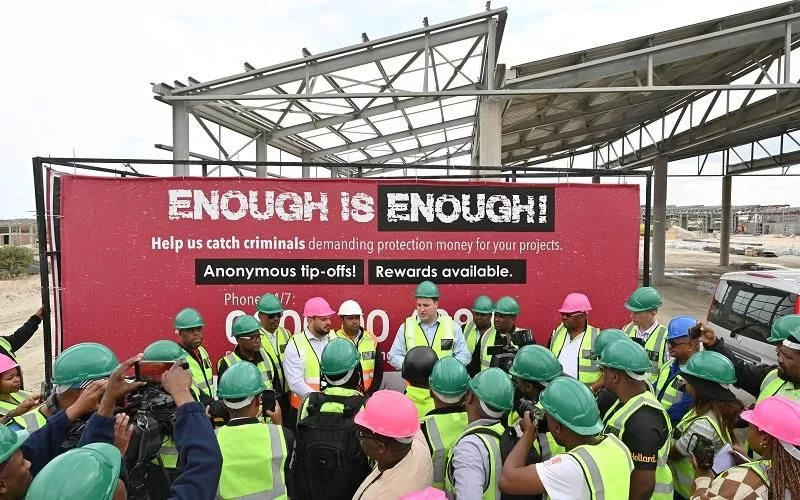Cape Town’s local administration has launched a campaign called “Enough is Enough! Genoeg is Genoeg! Kwanele!” to combat extortion and protect the city’s infrastructure projects. The campaign involves cooperation among city authorities, the police, and the community, with a 24-hour helpline and reward system set up to encourage citizens to report any extortion incidents. The campaign aims to identify and apprehend extortionists by rallying public support and forging partnerships with local communities.
What is the “Enough is Enough! Genoeg is Genoeg! Kwanele!” campaign in Cape Town?
The “Enough is Enough! Genoeg is Genoeg! Kwanele!” campaign is a comprehensive initiative launched by Cape Town’s local administration to combat extortion and safeguard the city’s infrastructure projects through cooperation among city authorities, the police, and the community at large. The campaign aims to eradicate extortion using a 24-hour helpline, reward system, and specialized city investigators. The primary goal is to identify and apprehend extortionists by rallying public support and forging partnerships with local communities.
United Front Against Extortion
The local administration of Cape Town, led by Mayor Geordin Hill-Lewis, has initiated a comprehensive campaign to combat extortion using the powerful catchphrase “Enough is Enough! Genoeg is Genoeg! Kwanele!” The primary aim of this campaign is to eradicate extortion and safeguard the city’s infrastructure projects through cooperation among city authorities, the police, and the community at large.
The campaign was officially inaugurated on 12 October 2023, when the Mayor and his team visited a MyCiTi depot construction site in Khayelitsha, a project that has faced severe challenges due to extortion efforts. Joining the Mayor were Alderman JP Smith, Mayoral Committee Member for Safety and Security, Councillor Rob Quintas, Mayco Member for Urban Mobility, and several other leaders from the City’s Executive Management Team and local representatives.
To rally public support for the fight against extortion, a 24-hour helpline (0800 00 6992) has been set up, along with a reward system. Billboards promoting the helpline will be placed along major thoroughfares, urging citizens to report any extortion incidents. Crucially, informants can report offences anonymously.
A Growing Obstacle to City Services and Projects
The pervasive practice of extortionists demanding “protection fees” has become a major hindrance to the city’s basic service provision and large-scale infrastructure projects. Consequently, the city is forging partnerships with local communities to identify and apprehend these criminals. Cash rewards will be given for valuable tip-offs that result in the arrest and prosecution of extortionists.
With an unprecedented R11bn infrastructure budget for 23/24, 73% of which will directly benefit lower-income households, the city has deployed more staff and contractors than ever before, particularly in vulnerable communities beset by crime. Delays caused by criminal activities are costly and detrimental to the city. The “Enough” campaign, therefore, aims to boost public reporting of extortion incidents. Specialized city investigators will pass on this information to the South African Police Service (SAPS) anti-extortion unit.
In order to further safeguard city workers and contractors, law enforcement officers frequently accompany teams on request in high-risk areas. Additional project security requirements have also been incorporated into project contracts. City employees and contractors must report all extortion attempts to the authorities, building a strong case against the criminals and protecting community interests.
Protecting Infrastructure and Community Interests
Mayor Hill-Lewis underscored the need for a unified response to organized crime, asserting that extortion is orchestrated by well-funded and highly efficient criminal networks. Collaborative efforts are the only viable means of defending the city against these criminals.
The campaign’s launch took place at the construction site of new MyCiTi depots in Khayelitsha and Mitchells Plain, which are central to the second phase of the MyCiTi bus service operations. Since May, multiple contractors have been targeted by interference and extortion attempts, causing several weeks of delays. This is part of a larger R60 million in transport project work affected by extortion-related delays.
Furthermore, as of October 2023, R110 million worth of human settlements project work has been impacted in 23/24. Notable city projects that have been disrupted by extortion include ACSA Housing Construction in Delft, where work is currently being hampered due to cases of attempted murder, murder, and arson; Delft select roadworks with reported cases of murder; and MyCiti construction site on Spine Road facing extortion-related delays.
Other impacted projects include Beacon Valley housing, Lentegeur Pedestrian bridge, Eastridge high-voltage cable relocation, Bishop Lavis roadworks, and Edward Street works in Ottery.
To promote public engagement in the fight against extortion, anonymous tip-offs can be submitted via phone at 0800 00 6992 or by email at SSIMS.SSIUReporting@capetown.gov.za. As Cape Town endeavors to shield its infrastructure and residents from the grip of extortion, the “Enough is Enough! Genoeg is Genoeg! Kwanele!” campaign presents a glimmer of hope and a chance for the community to unite against crime.
What is the primary goal of the “Enough is Enough! Genoeg is Genoeg! Kwanele!” campaign in Cape Town?
The primary goal of the “Enough is Enough! Genoeg is Genoeg! Kwanele!” campaign in Cape Town is to combat extortion and protect the city’s infrastructure projects through cooperation among city authorities, the police, and the community at large.
What is the 24-hour helpline set up for the campaign?
The 24-hour helpline (0800 00 6992) set up for the campaign is a hotline for citizens to report any extortion incidents. The hotline is accompanied by a reward system, and informants can report offenses anonymously.
What is the impact of extortion on Cape Town’s infrastructure projects?
Extortionists demanding “protection fees” have become a major obstacle to the city’s basic service provision and large-scale infrastructure projects. Delays caused by criminal activities are costly and detrimental to the city. As of October 2023, R110 million worth of human settlements project work has been impacted in 23/24, including the ACSA Housing Construction in Delft, where work is currently being hampered due to cases of attempted murder, murder, and arson.
How will the campaign identify and apprehend extortionists?
The campaign aims to identify and apprehend extortionists by rallying public support and forging partnerships with local communities. Specialized city investigators will pass on information from the public reporting of extortion incidents to the South African Police Service (SAPS) anti-extortion unit. Cash rewards will be given for valuable tip-offs that result in the arrest and prosecution of extortionists.
What additional measures are being taken to protect city workers and contractors?
Law enforcement officers frequently accompany teams on request in high-risk areas to safeguard city workers and contractors. Additional project security requirements have also been incorporated into project contracts. City employees and contractors must report all extortion attempts to the authorities, building a strong case against the criminals and protecting community interests.
What is the impact of the campaign on lower-income households?
With an unprecedented R11bn infrastructure budget for 23/24, 73% of which will directly benefit lower-income households, the city is deploying more staff and contractors than ever before, particularly in vulnerable communities beset by crime.
Who initiated the campaign?
The campaign was initiated by the local administration of Cape Town, led by Mayor Geordin Hill-Lewis.
How can citizens engage in the fight against extortion?
Anonymous tip-offs can be submitted via phone at 0800 00 6992 or by email at SSIMS.SSIUReporting@capetown.gov.za to promote public engagement in the fight against extortion.








